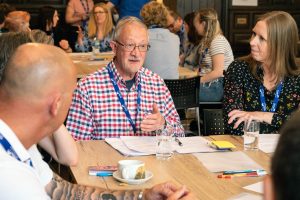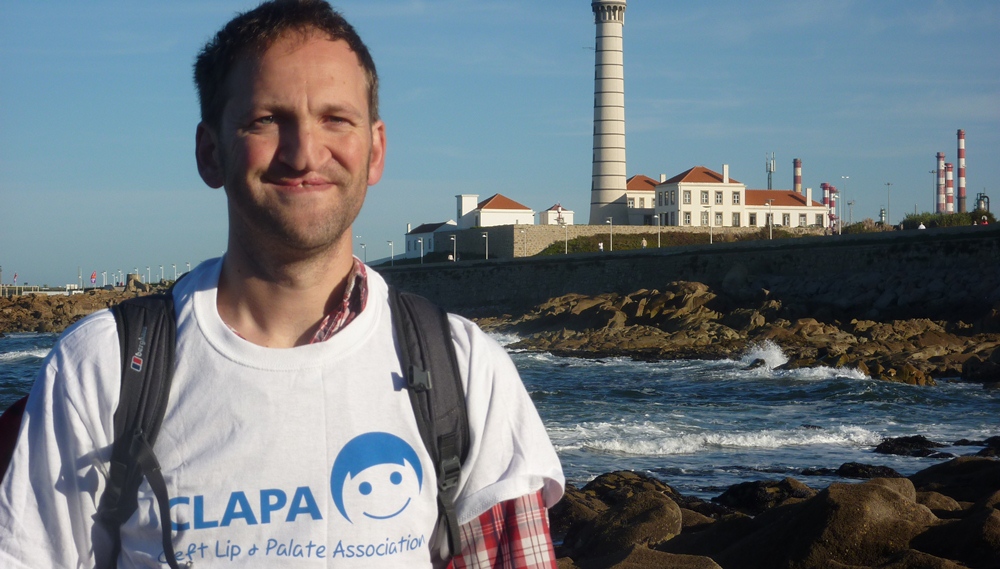
Meet Andrew, CLAPA Peer Supporter
CLAPA’s Peer Support Service connects adults born with a cleft to trained volunteers who can use their experiences and knowledge to give one-to-one support. We spoke to Peer Supporter, Andrew, about his experiences volunteering over the past few years and why he thinks it’s so important for adults to support each other.

“Once people know I have a cleft, and I’ve been through the things they’ve been through, it alters the conversation. It’s a kind of camaraderie almost, in that people know that I know what it’s like.”
Peer Supporter Andrew was born with a cleft lip and palate. He’s now trained to help others through our Peer Support Service to talk through issues and experiences of living with cleft as an adult.
Andrew signed up as a CLAPA volunteer in 2008 and has been one of our peer supporters for the past five years.
“There’s a lot of adults out there who’ve had a lifetime struggling with cleft and I urge them to contact us for a chat and support,” he said. “Many reach out on CLAPA’s Facebook pages and ask ‘has anybody else had this issue?’ Invariably, quite a few people respond and tell them how they got through it, and that’s incredibly valuable.
“The peer support service goes a step further and we can talk one-to-one to people. They just need to fill out the website form, and then somebody like me will get in contact. It’s such an important service for adults to help each other.”
Andrew was born with a cleft lip and palate in the 1950’s and considers himself “very fortunate” to be treated at Great Ormond Street Hospital, receiving “endless operations” during his first 18 years.
“But, like an awful lot of people I’ve spoken to, I was bullied at school. Those of us born with cleft had some really hard times and huge concerns about our looks growing up, causing problems into adulthood. This is why it’s so important to speak to each other and share experiences.”
“But, like an awful lot of people I’ve spoken to, I was bullied at school. Those of us born with cleft had some really hard times and huge concerns about our looks growing up, causing problems into adulthood. This is why it’s so important to speak to each other and share experiences.
“People I’ve met through the peer support system don’t know they can go back to treatment and have further surgeries as an adult, or about the cleft teams, and it’s so rewarding to be able to tell them about such services.”
Andrew has recently received gum and implant treatment at The Royal London Dental Hospital, and said he felt much safer under the care of the cleft restorative dentist, compared to a regular dental specialist. This experience has underlined his commitment to telling others with cleft about the support that is available to them.
“When I speak to people on the phone they say I sound so ‘normal’ but it wasn’t always that way. Going back to the old days there was no cleft teams, you were left to your own devices. And I got bullied very often because I couldn’t speak properly, and I knew if I spoke I’d get bullied more. So then they used to bully me because I was too quiet.
“I think one thing evident in people with cleft is a built in sort of determination saying ‘I’ve got to do better’. At school I pushed myself hard and felt I had to be in the top class and overcome my speech difficulties on a DIY basis.”
Andrew continued that determination in his career as a financial consultant, and hobby as a film extra – including appearances in the huge Netflix series The Crown.
He said he never forgets the struggles he’s had and is very keen to help as many others as he can through our peer support service.

The system is a quick and simple way to talk to a trained volunteer like Andrew, on a one-to-one basis, about whatever’s on your mind.
After filling in the form on our website, we’ll match you with a peer supporter who will contact you by email or phone, whichever you prefer, and arrange to talk. You might talk with your supporter just once, or several times, depending on your needs.
“Maybe they don’t want to have changes made and are happy with the way things are, and just want to chat, and that’s okay. The main thing is you can talk to somebody like myself that can listen and maybe share my story too.”
“Sometimes people want help, but they may be a little concerned or wary about what it involves,” added Andrew. “Maybe they don’t want to have changes made and are happy with the way things are, and just want to chat, and that’s okay. The main thing is you can talk to somebody like myself that can listen and maybe share my story too.
“It’s been really satisfying to be able to reach out and help people. One guy I spoke to years ago was worried about his looks and I told him about the cleft teams and what they can do for adults. He had some work done and came back to me months later and said ‘I can’t thank you enough for talking to me because it’s changed my life’.”
For more information about the peer support service:


